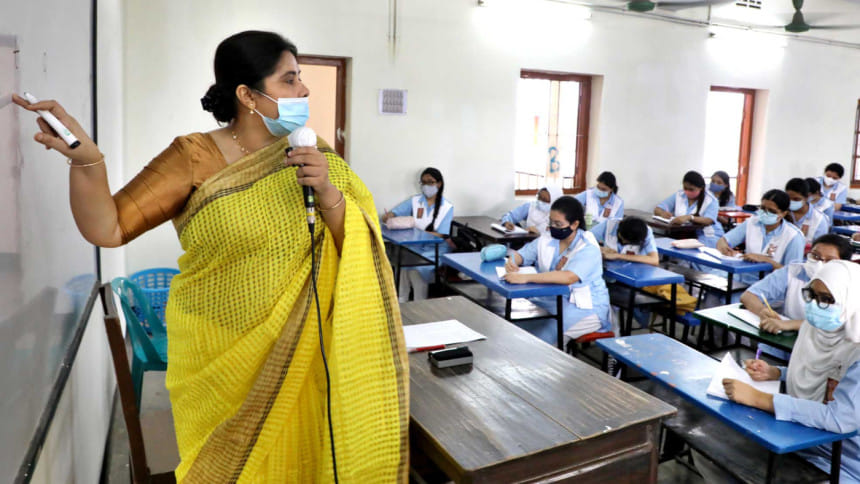Teachers also need support for learning loss recovery

We all can recall from our student days one or more teachers who touched our lives in a special way. They inspired us to aspire higher and served as our role models. The image of a teacher was of a scholar who selflessly dispensed knowledge and wisdom to the younger generation, lived a simple life, and was not too concerned about material rewards. They could be looked upon by the young as a mentor—a friend, philosopher, and guide.
This nostalgic view is overdrawn, but bears a strong kernel of truth. Is such an image wholly romantic and unrealistic in contemporary society? It should not be so. Romanticism apart, teachers are still the custodians of the young, and responsible to equip future citizens, leaders and workers with skills, knowledge and values. Teachers have a unique role in society—unlike any other occupation. The significance of this special role can be neglected at grave peril to society and its future.
Today, let's salute the teachers who still try to live by the ideal image, and let each of us do what we can to help more of them live by the values of the noble profession.
On World Teachers' Day last year, in this very space, I wrote: "A comparative disadvantage of Bangladesh along with countries in South Asia—unlike other regions of the world—is that it does not have a well-established, pre-service teacher education programme. Yet, school teaching is the single largest field of employment for college graduates. The common practice is to first recruit college graduates as primary or secondary teachers, and then let them go for one year to 18 months of pedagogy training…"
School teaching is not the first choice as a career for higher education graduates, especially the talented ones. It, therefore, ends up attracting the "bottom of the barrel" of the graduates, I had written. The basic talent gap cannot be remedied by in-service teacher training. The need to think afresh about attracting and keeping talented people in the profession of teaching is a major challenge for improving education system performance.
We have not witnessed any initiative to rethink the teaching profession. Meanwhile, the devastating impact of the Covid-19 pandemic has made the teacher's job more difficult than ever. Teachers, along with the rest of society, have suffered from the pandemic-caused health, economic and socio-emotional distress. Media reports have shown how teachers of private schools, known as "kindergarten schools," have resorted to menial work to support their families, when schools were shut down and they lost their income.
Now that schools have reopened (it is not certain if all kindergarten schools can reopen), teachers are faced with the challenge of helping their students to recover from the loss of almost two academic years. There are administrative instructions galore from the central authorities on how the class seating should be arranged, and which group of students should come to school for how many hours.
But there is not much guidance about how the students can be helped to recover their learning losses, how the losses can be assessed, and how the students can be helped to prepare for their grade-level instruction. There is a single-minded focus on holding public examinations as soon as possible, at any cost. Thankfully, the PECE and JSC exams have now been scrapped, which many educationists would like to see gone permanently. Teachers have been thrust into a "mission impossible" by the obsession with exams and insistence on sticking to the current academic year calendar, and have not been given enough guidance and support about how students can be helped in an unprecedented situation.
Recently, 10 well-known educationists of Bangladesh have jointly proposed some urgent steps for a learning recovery agenda (The Daily Star, September 25, 2021). The four points of urgent action they have proposed are: a) Conducting a simple and rapid assessment of students' level of preparedness for their grade focusing on basic skills in language and maths; b) Extending the school year to next June to allow more time for students, teachers, and schools to adapt to the new situation; c) Concentrating on students' readiness to learn and postponing annual and public exams to later in the extended academic year; and d) Supporting teachers to do their job well.
While proposing support for teachers, the educationists in their statement said that, in order to help with learning recovery, guidelines and orientation should be provided to schools and teachers on: a) The use of rapid assessment of grade-level student preparedness; b) Pedagogic steps to assist students by using results of the preparedness assessment; c) Instructional planning to focus on core competencies, aiming to help students become self-reliant learners; and d) Socio-emotional support to students and communicating with students and parents. Online platforms should be used extensively for the guidance and orientation of teachers and to complement classroom teaching for students.
While implementing the recommended urgent actions, critical longer-term measures also should be initiated, according to the educationists. One of these measures is to earnestly begin new thinking about the teachers/education workforce. No system of education can be better than its teachers, they said. While on-the-job training and orientation of teachers are necessary, ways have to be found to attract talented and well-motivated young people to—and retain them in—the profession of educators. Experiences of better performing countries can be lessons in this case. A longer-term plan has to be designed, backed by high-level commitment to see it through.
Let's hope that the crisis in education that we face today, aggravated by the pandemic, will prompt the policymakers to begin new thinking about teachers and teaching.
Dr Manzoor Ahmed is professor emeritus at Brac University.

 For all latest news, follow The Daily Star's Google News channel.
For all latest news, follow The Daily Star's Google News channel. 



Comments